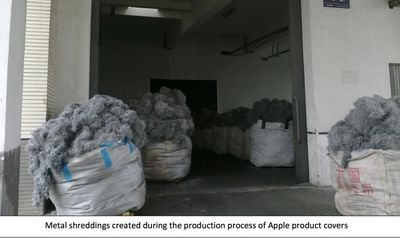One of Apple's suppliers is once again being accused of labor violations, with both Green America and China Labor Watch claiming a Catcher factory in Suqian, China has endangered the health and safety of its workers. Catcher is responsible for producing casings for many of Apple's products, including its MacBooks and iPads.
According to the report [PDF], Catcher has failed to provide adequate protective equipment for employees who handle toxic materials. The floor is said to be littered with aluminum-magnesium alloy shreddings and there are heavy amounts of dust in the air, which poses a health and fire safety risk. There are also locked safety exits preventing workers from leaving quickly during a disaster.

Fires and explosions are a major risk at supplier factories, and explosions at both Pegatron and Foxconn have caused major injuries in the past. At Catcher, workers have reportedly not participated in fire drills and have had poor safety training.
Other violations include student workers working long hours, excessive hours for all workers, forced overtime, and unpaid overtime for workers. Catcher is also said to be discriminating against potential employees based on age and the presence of tattoos.
"The health and safety violations found in this factory two years in a row are startling," said Elizabeth O'Connell, campaigns director at Green America. "The lack of fire drill training and locked safety exits are inexcusable in a work environment that requires the handling of flammable materials. Additionally, the lack of safety training in this facility and improper handling of hazardous materials contributes to the risk of life-threatening emergencies."
China Labor Watch initially reported its findings to Apple in 2013, and claims that though Apple promised to fix the issues, no progress has been made to improve worker conditions. Today's report calls on Apple to "do what is necessary" to ensure that factory workers are treated according to the law, and it asks consumers to reach out to Apple by filling out an email form. Apple, for its part, has given a statement to The New York Times saying that it has worked to correct issues at Catcher.
Apple said its most recent annual audit of the Suqian plant, in May, had "found some concrete areas for improvement in Catcher's operations, and we worked with Catcher to develop a corrective action plan."
Apple often finds itself in the spotlight over the conditions at the factories where its product components are produced, and the company has demonstrated little tolerance for factories that violated its rules. It is an ongoing issue for Apple, however, given both the sheer number of suppliers and the fact that factories benefit from producing high quantities of products at low costs.
Apple has committed to ensuring that its suppliers live up to a strict code of conduct that prevents underage labor and provides safe, comfortable working and living conditions for workers. Apple maintains a Supplier Responsibility Team to audit supply chain facilities and it also participates in factory assessments by the Fair Labor Association.
Note: Due to the political nature of the discussion regarding this topic, the discussion thread is located in our Politics, Religion, Social Issues forum. All forum members and site visitors are welcome to read and follow the thread, but posting is limited to forum members with at least 100 posts.



















Top Rated Comments
Too bad that the press otherwise rarely cares .... Even if Apple would only use 1% of the suppliers capacity and others use more, it would still be Apple being mentioned in the headline.
Don't get me wrong - it is great that there are reports about it and gets some attention, but a honest full list of companies using suppliers would also be appreciated.
Why are the not calling on the local law enforcement to enforce the law ???
Don't ever get it twisted
Are we thinking of the same Chinese government? Because the one I'm thinking of has a pretty atrocious record on human rights.
What you're advocating is a "see no evil, hear no evil" approach where we just merrily outsource our factory labor and don't worry about what goes on over there. Fortunately, there are companies and consumers who don't quite share your nonchalant libertarian view on the matter.
----------
I believe you're thinking of agriculture and animal husbandry, neither of which are exclusive to pure capitalism.